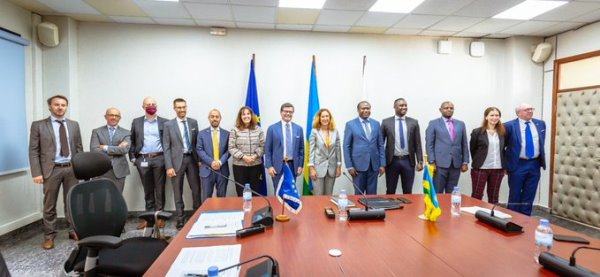
Today, Rwanda’s Minister of Finance and Economic Planning, Uzziel Ndagijimana and Deputy-Director General Myriam Ferran from the European Commission’s Directorate General for International Partnerships met to mark the launch of the European Union Multiannual Indicative Programme (MIP) for Rwanda 2021-2027.
They took stock of recent deliverables of the EU-Rwanda partnership, in particular in terms of the EU support for the Government’s response to the COVID crisis and the mobilization of concrete investments on vaccine manufacturing in Rwanda by the European private sector.
The two officials discussed the implementation plans for the new strategy, and committed to make quick progress on the formulation of new programmes on sustainable agriculture, education and urbanization.

The adoption of the new EU cooperation strategy with Rwanda is an important step to turn political and strategic decisions into concrete action. Through this new strategy, the EU and Rwanda will continue their joint work to achieve the aspirations of Rwanda’s Vision 2050 and mutual commitments towards Sustainable Development Goals and the Paris Climate agreement.
The EU, under the Multiannual Indicative Programme commits to provide funding amounting to € 260 million for the period 2021-24 to reinforce our bilateral cooperation and advance our common interests in the following areas:
– Education, Skills and Jobs for the Youth in the digital age
– A Green Deal for inclusive development
– Political and Economic Governance
The bilateral grant amount will be further complemented by regional and thematic funding, as well as lending by the European Investment Bank.
Deputy Director General of European Commission, Myriam Ferran reaffirmed the good cooperation between Rwanda and the EU: “The European Union has a long standing partnership with Rwanda and we are proud to be one of the key partners in the country’s path to sustainable development. With this strategy we renew the EU’s commitment to support pro-poor, sustainable and inclusive economic growth, by focusing on (i) skills development as a pre-requisite to attract investment and spur growth, (ii) a green deal for agricultural transformation and (iii) good governance and private sector development, including through developing the pharmaceutical sector as an emerging high political priority”
The Minister of Finance and Economic Planning Dr. Uzziel Ndagijimana noted: “EU support to key areas such as human capital development, green economy through agriculture transformation, private sector development as well as governance is a sign of strengthened collaboration, partnership and enhanced ownership to deliver transformational change we both desire.”
The new cooperation strategy will be implemented under the new Global Europe financing instrument. Global Europe will increase the collective scale and impact of European partners in Rwanda.
This development instrument brings a much stronger #TeamEurope approach, entailing a focus on partnerships with the European Investment Bank (EIB), EU Member States, their agencies and their development banks.
The MIP outlines two ambitious Team Europe Initiatives on “Agricultural Transformation” and “Sustainable Rwandan cities fit for the Digital age”, which both have a strong participation of EU Member States and clear potential for transformative impact.
All of the proposed priorities are also fully in line with the European Union’s Global Gateway Strategy with interventions focusing on fighting climate change and protecting the environment, improving education and global health security, as well as boosting the competitiveness of the Rwandan economy.
To operationalize the priority sectors, each year, the European Commission adopts Annual Action Plans, defining specific programmes. In December 2021, EU adopted Annual Action Plan 2021 for Rwanda, including programmes on:
– Climate-smart and inclusive agriculture (€69M), including a budget support operation and support for agriculture value chains.
– Economic Governance and Business Environment (€20,5M), including inter alia support to entrepreneurship, mining and RFDA on vaccine manufacturing.
Programming for the 2022 Action Plan for a total amount of around €85 million is in full swing. EU support will focus on interventions supporting the education sector, including technical and vocational training, consolidating justice reform, accountability, and reconciliation efforts and thirdly, as well as upgrading informal settlements in Kigali. (End).
